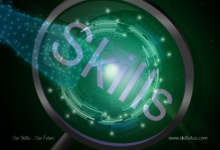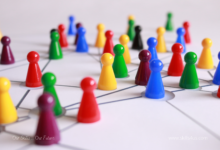
Secrets Behind Keeping Our Jobs In The Artificial Intelligence (AI) Era In The Future
Today, many people are nervous about what AI means for their future hires, especially those who have lived for many years performing the same old tasks at work. For many people, AI at work sparks enthusiasm and curiosity at work. These people can embrace the unpredictable nature of life and thus realize the constant need for flexibility in ideas and action and a desire to learn new things such as skills, competencies, and knowledge in new areas. Suppose you can think about and analyze what is going on around you. In that case, it will help you discover potential opportunities to utilize your talents and identify new skills and knowledge needed.
Humans are Different from Machines.
According to the latest global research and studies, this demand for flexibility and adaptability will increase with the growth of workforce automation. People need to develop particular skill sets that AI cannot perform well with current technology.
These skills include creativity, social and emotional intelligence, sensing, and computational thinking. These skills are supposed to help build an understanding of human capabilities that machines can easily replicate.
Even if AI develops these capabilities, humans should still be able to differentiate themselves from machines by adjusting the application of these new skills and knowledge with the interpersonal skills necessary for real career success. It leads to the following question: ” can automate what responsibilities, duties, and activities to make things run more smoothly?”
AI Develops Abilities and Talents.
It will support people in the future, not replace them. People will develop their abilities and talents by applying these skills to new technologies and developments. It could lead us to a digital economy where people create things rather than produce them because AI can create multiple models in just a few minutes. Computational thinking is a skill that not many people currently have because they don’t need it to do their jobs. It could be a problem when AI begins to advance and “compete” with humans for jobs.
You can automate duties, responsibilities, and activities, but this depends on your industry and business. For example, it replaces drivers with self-driving cars, which are becoming more common but will not replace teachers. That’s because teaching requires creativity and social and emotional intelligence skills that machines can’t yet perform.
AI Coexistence With the Future of Humans
The future of humanity will always be human. So the question should be: “How can AI coexist with the human future?” And not, “How will people interact with AI in the future?” So, “How can we integrate the unique capabilities of AI systems and people to discover a new human ‘specialty’?”
The answer to these multifaceted questions:
1. Embrace computing
Humans must embrace computing as part of their future while striving to preserve what makes them unique and different. Such as creativity and social intelligence. Furthermore, humans need to realize how they can use their exceptional skills to improve AI systems rather than feel threatened by them.
2. AI is an enabler and motivator.
Because it can be the language that connects people who are having difficulties understanding each other to help them cooperate better, the success of people working with AI depends on how well they know the working principles of this technology.
3. Focus on creativity
Knowing the impact of AI on society, business strategy, industries, and public policies is essential. We have to focus on creativity and being better than machines in the new age. We must consider solutions that allow humans and machines to complement each other, maximizing the potential of both.
Yet machines can’t reproduce the image. The elevation of humans to higher-value tasks benefits organizations and any individual’s career advancement and development.
Machines can help human employees do more meaningful and more creative work. Research and studies indicate that the productivity of many countries of the world will rise by at least 40% by 2035.
4. Establishing fruitful partnerships between humans and machines
Understanding the differences between machines and humans will be one of the most critical skills in the future. For example, we will need to decide which parts of the organization must be managed by machines and which humans must manage functions.
With that in mind, let’s take a look at what machines can currently do better than humans. Nowadays, machines excel in continuous monitoring. And they will have a lower error rate than humans in repetitive tasks and more consistent information gathering and analysis. Note that this develops a broad and easily accessible knowledge base.
For example, we can achieve this through some of the following skills:
- Creative Problem Solving: Humans can use their emotional intelligence to interact with the machine using natural language and make the machine understand it. It would help solve problems where the machine would have a deeper understanding of human fears.
- Emotional intelligence: As humans embrace computing, they must learn more about AI and how it works with machines more effectively. It’s like building a bond between you and your car; if you can’t understand how a car works, it’s hard to be friends with it.
- Computational thinking: AI can understand human emotions and context because it understands natural language processing and computational capabilities. On a human level, understanding the design principles that underlie computing systems can help the people who work within those systems know how they work to build on them.
Look to the Future
The future of our jobs depends on how well we understand AI. And use our unique skills to improve rather than threaten its systems. Can achieve the convergence and coexistence of humans and artificial intelligence by having clear roadmaps for individuals to learn and acquire knowledge.



